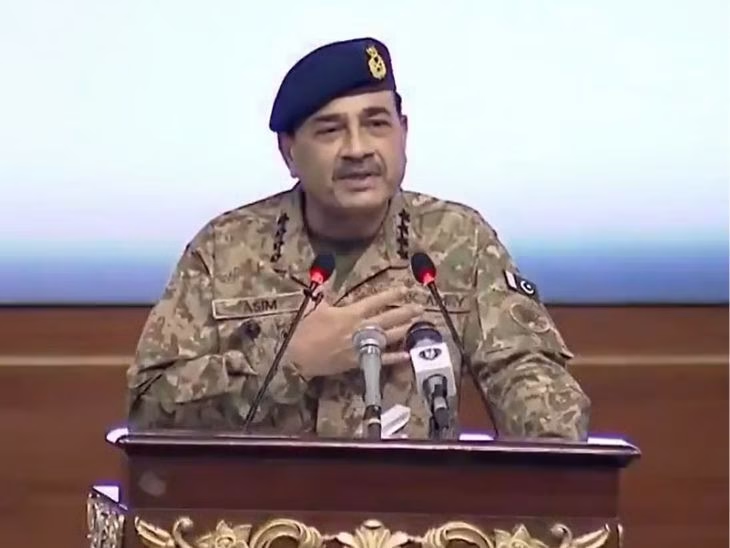
Islamabad4 hours ago
- Copy link
Pakistan Army Chief Asim Munir gave a speech against India at the Pakistan Naval Academy on Saturday.
Pakistan Army Chief Asim Munir has said that India attacked twice without any provocation. Asim Munir on Saturday accused India of intentionally creating tension at the Pakistan Naval Academy in Karachi at his speech.
Asim Munir said, ‘In the last few years, India attacked Pakistan twice without provocation. Pakistan showed restraint and maturity both times and has proved itself as a responsible country to maintain peace by showing its accountability towards regional security.
According to a report by Don News of Pakistan, Munir said,
Pakistan was close to ending terrorism, but India is deliberately causing tension.
Munir said on the Kashmir issue, “Pakistan wants a solution to the Kashmir issue according to the United Nations resolutions and the resolve of the Kashmiri people.” The Pak Army Chief demanded a fair and peaceful solution for permanent peace in Kashmir.
Munir said- Kashmir Islamabad’s neck vein A few days before the Pakistan-backed terrorist attacks on 22 April in Pahalgam, Jammu and Kashmir, Munir described Kashmir as part of Pakistan, describing the Indian region as the neck of Islamabad.
Munir, while addressing the Pakistani migrants living abroad, said on April 17, “Kashmir is the vein of our throat, it will be the vein of our throat, we will not forget it.”
A week after Munir’s comment, terrorists killed 26 tourists in Pahalgam, Kashmir. In response, India launched Operation Sindoor on 7 May.
In this, the Indian Army had an airplane at Pakistan Occupied Kashmir (POK) and 9 terrorist bases in Pakistan. 100 terrorists were killed in it. The ceasefire agreed between the two countries on 10 May.
Pakistan remained again in Operation Sindoor The Pakistani Army and the government together are re -building up terrorist bases and training camps destroyed in Operation Sindoor in India. According to media reports, with the help of the Pakistani Army, terrorist organizations are now building small and high-tech training camps in dense forests near the Line of Control (LOC). Their purpose is to avoid monitoring the Indian Army and airstrikes.
These camps are being built in areas like Luni, Putwal, Tipu Post, Jamila Post, Umranwali, Chaprar, Fortword Kahuta, Chhota Chak and Junglora. These include thermal imagers, the forest monitoring radar and satellite dodging techniques.
Maintain launchpad on POK and International Border
Pakistan is again developing 13 launchpad in POK. These include Kel, Sharadi, Dudhanial, Atmukam, Jura, Lipa Valley, Pachiban Chaman, Tandpani, Nayali, Janakot, Chakoti, Nikal and Forward Kahuta.
Apart from this, Masroor is building four launchpads in Masroor’s elder brother, Chapra, Luni and Shakargarh on the international border of Jammu sector.
After the Pahalgam attack on 22 April, India had destroyed several terrorist bases in Pakistan and POK by running Operation Sindoor on 7 May.
Munir asked the destroyed bases to fix in 11 days A week ago, PAK Army Chief Munir had fixed the deadline to repair the Markaj Subhan Allah Complex, Bilal Mosque, Ummul Kurra, Jamia Dawa Islamic Madrasa and other terrorist bases destroyed in Indian attacks.
Actually, madrasas will open in Pakistan from July 1. The first madrasas were to open from June 20, but due to their lack of correct, the date of opening of the madrasa has been changed. Munir has formed a team to repair them. He himself is monitoring these works. It is clear that Pakistan is again raising the terrorism raised here.
,
Read this news too …
Suicide attack in Pakistan’s Khyber province, 13 soldiers killed, 29 injured; The attacker inserted into a army convoy laden with explosives
On Saturday, a suicidal attacker targeted a military convoy in the northern Waziristan district of Pakistan’s Khyber Pakhtunkhwa province. 13 soldiers were killed in it. While 10 soldiers and 19 citizens are injured. According to the news agency AFP, the attacker inserted the car -laden vehicle into a military convoy. Read the full news here …